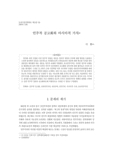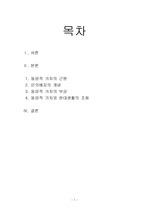

-
 * 본 문서는 배포용으로 복사 및 편집이 불가합니다.
* 본 문서는 배포용으로 복사 및 편집이 불가합니다.
미리보기
서지정보
· 발행기관 : 21세기정치학회
· 수록지 정보 : 21세기정치학회보 / 15권 / 3호
· 저자명 : 이행
목차
Ⅰ. 문제의 제기
Ⅱ 민주적 공고화의 쟁점들
Ⅲ 권력의 순치와 유교민주주의
Ⅳ. 민주주의를 위한 변명
Abstract초록
민주화 이후 수립된 신생 민주적 정권은 새로운 정치적 게임의 규칙에 대한 합의를 도출하고 그것에 입각해서 갈등을 성공적으로 처리함으로써 국민들로부터 정권에 대한 확고한 지지를 얻어 정당성을 획득해야 하는 새로운 정치적 과제에 직면한다. 유교민주주의는 이러한 정치적 과제들을 해결하는데 있어 어떤 성격의 민주적 정치체제가 공고화될 것인지에 대한 흥미로운 논의의 단초를 제기한다. 그것은 17, 8세기 근대 시민혁명 이후 서구에서 수립된 자유민주주의체제에 대하여 자유주의가 제거된 전면적 대안을 모색하는 것일 수도 있고, 아니면 자유민주주의적 틀 안에서 유교적 가치를 비판적으로 수용할 수 있는 가능성에 대한 모색이 될 수도 있다. 이글에서는 자유민주주의를 개념적으로 분석함으로써 전자의 접근법이 성립하기는 어려우며, 한국과 같은 서구와는 상이한 유교문화적 전통을 가진 사회에서 유교적 가치가 자유민주주의 체제의 한계를 극복하고 신생 민주적 정권이 공고화되는데 비판적으로 수용될 수 있다고 주장한다.영어초록
Newly democratized regimes confront new challenges. They have to establish a new set of rules of a democratic game under which they can draw popular support by successfully resolving conflicts. That is the process of democratic consolidation. Debates on Confucian democracy provide an interesting clue as for what kind of a democratic regime could be consolidated. Confucian democracy could either grope for an alternative of liberal democracy that had been developed in Western European countries since the 17th century. Or it could be an attempt to overcome dilemmas of liberalism within the political framework of liberal democracy. This paper argues that Asian values could be an asset for democratic consolidation in Asian societies when they are critically reappraised.참고자료
· 없음태그
-
자료후기
-
자주묻는질문의 답변을 확인해 주세요

꼭 알아주세요
-
본 학술논문은 (주)학지사와 각 학회간에 저작권계약이 체결된 것으로 AgentSoft가 제공 하고 있습니다.
본 저작물을 불법적으로 이용시는 법적인 제재가 가해질 수 있습니다. -
해피캠퍼스는 구매자와 판매자 모두가 만족하는 서비스가 되도록 노력하고 있으며, 아래의 4가지 자료환불 조건을 꼭 확인해주시기 바랍니다.
파일오류 중복자료 저작권 없음 설명과 실제 내용 불일치 파일의 다운로드가 제대로 되지 않거나 파일형식에 맞는 프로그램으로 정상 작동하지 않는 경우 다른 자료와 70% 이상 내용이 일치하는 경우 (중복임을 확인할 수 있는 근거 필요함) 인터넷의 다른 사이트, 연구기관, 학교, 서적 등의 자료를 도용한 경우 자료의 설명과 실제 자료의 내용이 일치하지 않는 경우
“21세기정치학회보”의 다른 논문도 확인해 보세요!
-
Transitional Corporate Governance in Japan 21 페이지
This paper investigates the transition of Japanese corporate governance in the context of the change of funding and ownership structure which has taken place since the 1980s. Unlike previous studies .. -
The Ajumma and Confucianism 30 페이지
I argue that Confucianism is a progressive value system for the ajumma. Confucianism for the ajumma represents a framework to bridge the structures of liberalism and feminism. It also breaks with ce.. -
2005 APEC 정상회의와 아ㆍ태 지역의 정치경제 22 페이지
본 연구는 APEC에 대한 국제정치적 접근을 중심으로 2005 APEC 정상회의의 쟁점, 성과 그리고 과제를 탐구한다. 또한 이런 성과를 통해 APEC 정상회의가 아ㆍ태지역에서 갖는 정치경제적 시사점을 고찰한다. 2005 APEC 정상회의는 다음과 같은 3가지 핵심적인 성과를 가져왔다. 첫째, APEC의 가장 큰 목표인 아ㆍ태지역의 무역ㆍ투자 자유화 및.. -
포스트 APEC의 지역경제 파급효과 분석 26 페이지
본 연구에서는 Post-APEC 사업을 광의로 해석하여 사업의 성과를 계량화 하고 지속적으로 비교분석하여 향후 대형 국제행사의 유치와 개최전략을 수립하는데 적극 활용하는 방안을 모색하고, 또한 다양한 측면에서 Post-APEC사업을 보완 발전시켜 나감으로써 APEC 개최효과를 극대화함은 물론이고 장기적으로 지속되도록 하자는 데에 목적을 두고 있다. 따라.. -
한국의 통일지향적 이념과 체제모색 : 남북한 체제와 분단국의 분단․통일체제의 사례를 고려하여 27 페이지
이 논문은 한민족의 진정한 자유, 평등, 인권, 민주주의 확립을 위해 남북한의 통일과정에서나 통일된 국가에 있어서 체제이념과 정치․경제의 구조가 어떠한 것이어야 하는가를 논의한 것이다. 먼저, 분단 이후 남북한의 체제와 이념을 인지하고 한때 분단되었다가 통일을 이룩한 베트남, 독일, 예멘의 분단체제와 통일 후의 체제이념지향을 비교 검토하였다...
찾으시던 자료가 아닌가요?
지금 보는 자료와 연관되어 있어요!
문서 초안을 생성해주는 EasyAI



